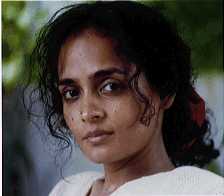| the-south-asian.com SEPTEMBER 2001 | ||
| about us contact us data bank past issues the craft shop the print gallery | ||
|
SEPTEMBER 2001 Contents Interview Heritage Cultural Heritage of south Asia People Communities Lifestyle Films Editor's Note
Books
|
Page 5 of 6 Arundhati Roy interviewed by David Barsamian (continued)
"....privatization is only a further evolution of the centralized state" Q: But you say about your own politics that you're "not an anti-development junkie or a proselytizer for the eternal upholding of custom and tradition."Roy: How can I be? As a woman who grew up in a village in India, I've spent my whole life fighting tradition. There's no way that I want to be a traditional Indian housewife. So I'm not talking about being anti-development. I'm talking about the politics of development, of how do you break down this completely centralized, undemocratic process of decision-making? How do you make sure that it's decentralized and that people have power over their lives and their natural resources? Today, the Indian government is trying to present privatization as the alternative to the state, to public enterprise. But privatization is only a further evolution of the centralized state, where the state says that they have the right to give the entire power production in Maharashtra to Enron. They don't have the right. The infrastructure of the public sector in India has been built up over the last fifty years with public money. They don't have the right to sell it to Enron. They cannot do that. Three-quarters of our country lives on the edge of the market economy. You can't tell them that only those who can afford water can have it.Q: Still, I sense some optimism on your part about what you call the "inherent anarchy" of India to resist the tide of globalization.Roy: The only thing worth globalizing is dissent, but I don't know whether to be optimistic or not. When I'm outside the cities I do feel optimistic. There is such grandeur in India and so much beauty. I don't know whether they can kill it. I want to think they can't. I don't think that there is anything as beautiful as a sari. Can you kill it? Can you corporatize a sari? Why should multinationals be allowed to come in and try to patent basmati rice? People prefer to eat roti and idlis and dosas rather than McDonald's burgers. Just before I came to the U.S., I went to a market in Delhi. There was a whole plate of different kinds of dal, lentils. Tears came to my eyes. Today, that's all it takes to make you cry, to look at all the kinds of dal and rice that there are, and to think that they don't want this to exist.Q: Talk about the material you covered in "The End of Imagination" concerning the nuclear testing on the subcontinent.Roy: It's so frightening, the nationalism in the air. I'm terrified by it. It can be used to do anything. I know that a world in which countries are stockpiling nuclear weapons and using them in the ways that India and Pakistan and America do to oppress others and to deceive their own people is a dangerous world. The nuclear tests were a way to shore up our flagging self-esteem. India is still flinching from a cultural insult, still looking for its identity. It's about all that.With one hand, you're selling the country out to Western multinationals. And with the other, you want to defend your borders with nuclear bombs. It's such an irony! You're saying that the world is a global village, but then you want to spend crores of rupees on building nuclear weapons.
Copyright © 2000 - 2001 [the-south-asian.com]. Intellectual Property. All rights reserved. |
|
